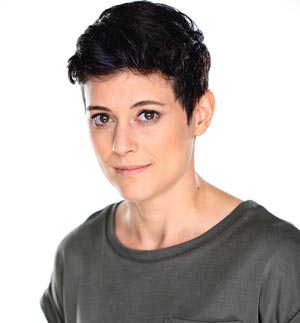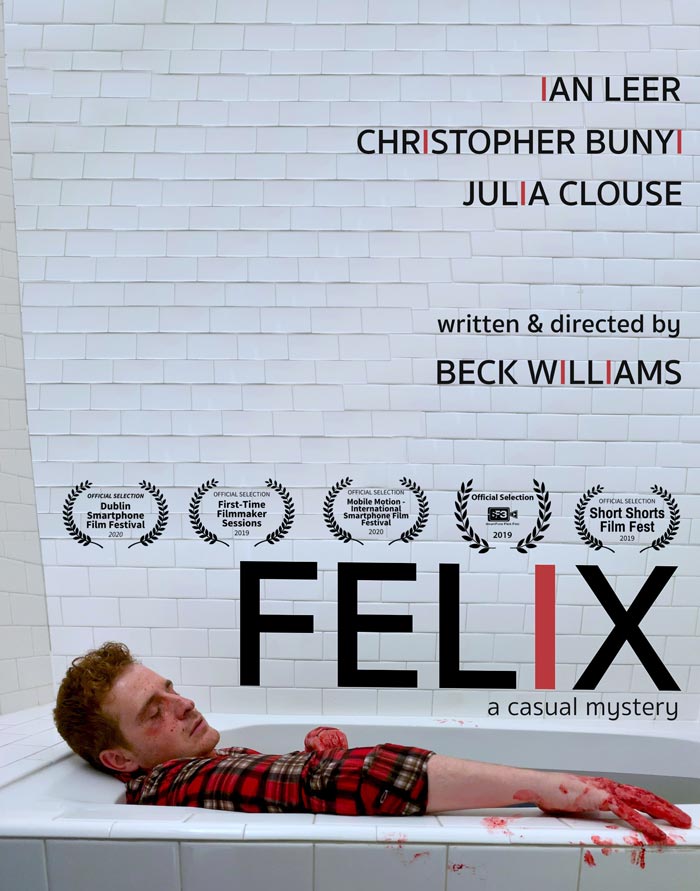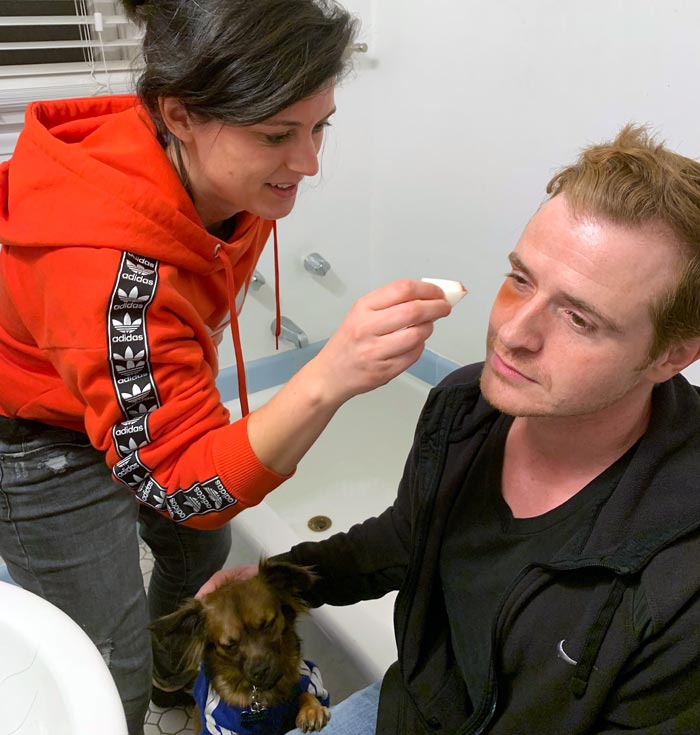Shot entirely on an iPhone XR with a crew of 1 (Beck Williams, also the writer and director), is a tightly-paced short thriller starring Ian Leer which has been selected for this years Mobile Motion Film Festival (amongst others). We asked Beck Williams to tell us more about the film.
“An average guy with a memory problem wakes up in a bathtub covered in blood and retraces the events of the past week.”
What is the story behind your film?
Felix is an average guy with a memory problem who claims he doesn’t recall why he has woken up covered in blood. As he takes us through his memories of the past week, he hopes to convince us to trust everything he says. I think the biggest question the film asks is one of my favorites to explore: What drives decent people to do terrible things?
What were the steps which led you to make it?
I had been working on a collaborative web series with a group of creatives, and we faced setback after setback. A small budget and a large crew meant that we had numerous scheduling issues, and eventually the project was delayed indefinitely. I decided to take that frustration and channel it into something productive: a minimalist short with a small cast, and a single crew member (me).
I had the chance to wear multiple hats and learn by doing. It was a blast! I knew I was going to be limited without a crew and especially when it came to sound.
I feel that sound is the hardest to get right, and such an essential element. This whole idea of Felix came from the question: “What if I make a film that requires no sound until post?” This sparked an idea – an unreliable narrator talking directly to us, and guiding us through his memories. The story built from there.
Why did you choose a smartphone to film with?
Of course smartphones are easily accessible, but more than this, I am amazed at the quality of the phone cameras and apps. I felt that I had a wonderful tool at my disposal and needed to take advantage. I didn’t have access to other cameras, but I didn’t feel I needed to, having seen what the iPhone XR could do, and other friends’ great projects (thanks Ian Leer aka Felix!)
I feel that the smartphone opens up the ability to tell a story regardless of budget or other restrictions. (It’s also much easier to film in public inconspicuously). There are a range of benefits, and even having recently purchased a cinema camera, I will never stop using my phone to film.
What equipment did you use?
I shot entirely on an iPhone XR. I used FiLMiC Pro (a dream to work with) but unfortunately did not have the option for log or flat at the time (which made coloring an interesting process in post). I used a gimbal as well as handheld because the in-camera image stabilization was great. I edited on Adobe Premiere on a MacBook Pro. My friend Jay Hawk did some visual effects using adobe software as well. All audio was recorded on a voiceover mic in post-production.
How much did you know about filmmaking before you made this film?
This was truly my first film. I produced a short I wrote and acted in, but didn’t get much of a chance to direct at all – there just wasn’t time.
I had a great DP, we had a location and we filmed as fast as we could. I hardly saw any footage until the editing room. I would say I planned and produced, but was very little hands on for the filming.
Being present for all of the editing did give me a great insight into learning Adobe Premiere which I later used for Felix. All my experience prior came as a film actor and one filmmaking class in high school. I knew what it was like to be on set as an actor, but Felix was a great learning experience as a first-time director, DP, editor, etc.
“Making this film has opened up my mind as an artist…”
What did you like/not like about filming with a phone?
I loved the simplicity, the ability to film in public easily, the quick set up, and how small and light the equipment was. I was also impressed with the performance of the phone in low light.
What I didn’t like: some of the limitations of the phone. I was able to pull focus a few times with was so rad! But obviously close-ups weren’t as dynamic, playing with focus and depth was limited, and image noise was a struggle at times.
To me, these aren’t enough to really complain about. My cinema camera is expected to do incredible things, but in my hands, it will be limited as well as I am still learning. The learning curve is just more forgiving with a smartphone.
Has making the film changed your life in any way?
Yes. Making this film has opened up my mind as an artist and has allowed me to better understand the range of components that go into filmmaking. It’s funny, because I adore the collaborative nature of filmmaking, yet doing a project almost solo until post-production was a gift to me.
When I have the awesome opportunity to work with a team, I have a more well-rounded understanding of everyone’s field and skillset, what they need, how I can help, and how to communicate effectively in each department. I have “learned to learn” in a way – honing my skills in problem solving and finding the answers.
I have learned that “limitations” can actually be tools in creating. Having to take inventory of what I do or do not have available sparks creativity.
How successful was the film, personally and in gaining an audience for your work?
I think Felix has been pretty successful. Along with MoMo, the film has been shown in festivals in the US, Australia, and Europe, and just won the Best Fiction award at the Dublin Smartphone Film Festival. It’s exciting to think that along with online views, Felix has been received by live audiences internationally.
On a personal level, I’m thrilled. Sometimes at the end of various projects, scripts, etc. I see my work through the lens of: “I have been too close to this too long and now I don’t even like it.”
Felix is something I am still very happy with, and that’s a good feeling as an artist. It’s not uncommon, for me at least, to be underwhelmed with past work. The fact that I can watch this film now and still be happy with it feels like a new level in my creative experience.
Looking back on the movie, is there anything you’d have done differently?
There are minor things I probably would have changed on set that you can’t work on in post. Ian and I like to joke that the “crew really dropped the ball” on certain things, because of course it was always my mistake. I would have wanted to work a little more on some of the action elements.
But in general, there isn’t anything big enough to be a thorn in my side. I am happy there isn’t anything that makes me cringe… much. Again, that’s pretty new for me when looking back at a completed project!
How important are film festivals that give these kind of films a platform for you?
These festivals are incredibly significant. We are in an amazing age where most people have an opportunity to film and create. It used to be necessary to get your hands on the right equipment to even have a shot, but now we have that equipment in our pockets.
Filmmaking is tough, there are so many elements that have to be accounted for. But people now have the chance to create and share without the barrier of a certain budget, certain equipment.
We can learn by doing and practice versus waiting for an opportunity to try. These festivals recognize and encourage the love of storytelling. The more artists learn to utilize the smartphone as a vehicle to storytelling, the more creative content can be shared.
Festivals like MoMo not only celebrate the efforts of filmmaking, they are pushing to a movement that allows more artists and filmmakers a chance to put their work out there.
I am grateful for this opportunity and for MoMo’s vision of celebrating this specific style of filmmaking.

Eager to learn more?
Join our weekly newsletter featuring inspiring stories, no-budget filmmaking tips and comprehensive equipment reviews to help you turn your film projects into reality!
Simon Horrocks
Simon Horrocks is a screenwriter & filmmaker. His debut feature THIRD CONTACT was shot on a consumer camcorder and premiered at the BFI IMAX in 2013. His shot-on-smartphones sci-fi series SILENT EYE featured on Amazon Prime. He now runs a popular Patreon page which offers online courses for beginners, customised tips and more: www.patreon.com/SilentEye



